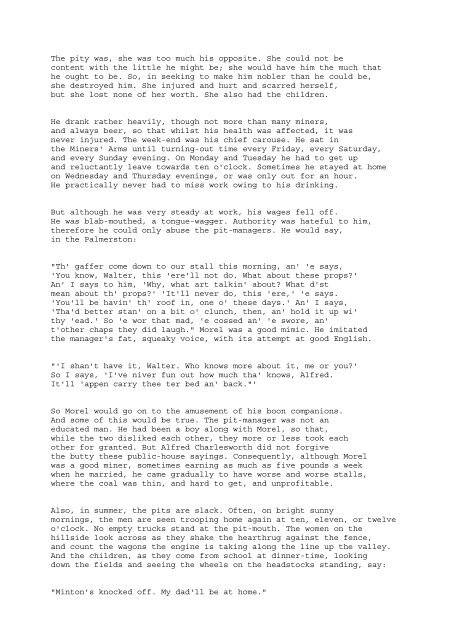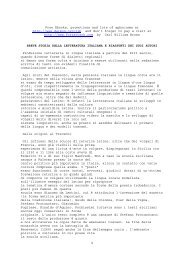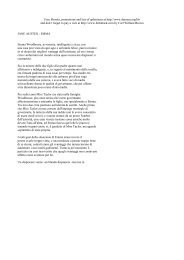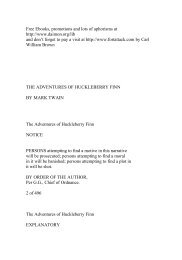- Page 1 and 2: Free Ebooks, promotions and lots of
- Page 3 and 4: were sunk, until soon there were si
- Page 5 and 6: "You can have your dinner as soon a
- Page 7 and 8: onnet and her cloak. She smiled whe
- Page 9 and 10: of the cut pastures. The sky overhe
- Page 11 and 12: said Morel. He was extraordinarily
- Page 13 and 14: experience of what being a man mean
- Page 15 and 16: He came and bowed above her. A warm
- Page 17 and 18: He had signed the pledge, and wore
- Page 19 and 20: "Eighty pound, if you're so keen on
- Page 21 and 22: "Did he?" "Yes, he did." The other
- Page 23: one Sunday morning, to the chatter
- Page 27 and 28: "I'm not sure I wouldn't rather be
- Page 29 and 30: of face that seems to lack eyelashe
- Page 31 and 32: as having some occult, malevolent p
- Page 33 and 34: "Comin' home in his what?" he snarl
- Page 35 and 36: olt behind her with a bang. Then he
- Page 37 and 38: Her quietened heart beginning to be
- Page 39 and 40: CHAPTER II THE BIRTH OF PAUL, AND A
- Page 41 and 42: "Yi--there's one big 'un," he repli
- Page 43 and 44: "Eh!" said Mrs. Anthony. "You can f
- Page 45 and 46: And he went on striking. He was tir
- Page 47 and 48: "What is it?" she asked, feeling si
- Page 49 and 50: "Go now," she said. "I will, my las
- Page 51 and 52: "Goodness!" cried Mrs. Morel. "Mr.
- Page 53 and 54: Whereupon Mrs. Morel, trying to soo
- Page 55 and 56: Suddenly, looking at him, the heavy
- Page 57 and 58: anything it'll make my blood boil,"
- Page 59 and 60: he went across to her, swayed, caug
- Page 61 and 62: "I can do it myself," she replied.
- Page 63 and 64: Immediately he had finished tea he
- Page 65 and 66: "So you filch sixpence out of my pu
- Page 67 and 68: "Why, where should you have gone? Y
- Page 69 and 70: He had a fine constitution, so that
- Page 71 and 72: and tenderness between the separati
- Page 73 and 74: "'Appen 'e is, but that doesn't giv
- Page 75 and 76:
But that evening Morel came in from
- Page 77 and 78:
And, glaring at the boy, he ran for
- Page 79 and 80:
She was very proud of her son. He w
- Page 81 and 82:
"And why didn't you tell me?" "Beca
- Page 83 and 84:
His mother implored him to take mor
- Page 85 and 86:
'I told mother about you this morni
- Page 87 and 88:
the face of the hidden doll. Annie
- Page 89 and 90:
"Why, what have I done to the child
- Page 91 and 92:
So they were happy in the morning--
- Page 93 and 94:
of anxiety and expectation in the r
- Page 95 and 96:
"Oh, nothing--about famous women."
- Page 97 and 98:
This Morel loved to do. "Well, ther
- Page 99 and 100:
"Nothing," he replied. But he ate n
- Page 101 and 102:
"This childt's axin' for thee; how
- Page 103 and 104:
have died rather. "Good gracious!"
- Page 105 and 106:
No window was open. Sometimes in wi
- Page 107 and 108:
Paul went to the counter. "Seventee
- Page 109 and 110:
put it before him. Suddenly he turn
- Page 111 and 112:
So the boy remained alone. Mrs. Mor
- Page 113 and 114:
Paul was waiting for her. He loved
- Page 115 and 116:
Paul looked in the oven; tapped the
- Page 117 and 118:
out of this way and went into the f
- Page 119 and 120:
home again. Morel hated to go back.
- Page 121 and 122:
Christmas Eve. Mrs. Morel surveyed
- Page 123 and 124:
cheerily, and immediately began to
- Page 125 and 126:
He had brought them endless present
- Page 127 and 128:
"I don't know for sure, but it's 'i
- Page 129 and 130:
"A comb, a knife and fork and spoon
- Page 131 and 132:
with wonderful healing flesh, and s
- Page 133 and 134:
So she talked to her son, almost as
- Page 135 and 136:
measuring people against himself, a
- Page 137 and 138:
Therefore he was soon visiting and
- Page 139 and 140:
tight inside him. He would have suf
- Page 141 and 142:
of the dragon. They emerged into a
- Page 143 and 144:
"Where did you learn to write?" sai
- Page 145 and 146:
school now." "He would live in Best
- Page 147 and 148:
she's taking that man HIS pudding,
- Page 149 and 150:
every second as the flowers was goi
- Page 151 and 152:
"She should have her own money if s
- Page 153 and 154:
He had the season-ticket, which had
- Page 155 and 156:
Paul was led round to a very dark c
- Page 157 and 158:
eappeared coatless, turning up a sm
- Page 159 and 160:
"You'd better watch me," he said to
- Page 161 and 162:
the "Mr." Then all at once Mr. Jord
- Page 163 and 164:
"I never said it WAS your fault. Wi
- Page 165 and 166:
with so much that she expected her
- Page 167 and 168:
When he came in at eight in the mor
- Page 169 and 170:
At the end of the song Fanny would
- Page 171 and 172:
up two long hills, down two short h
- Page 173 and 174:
and driving them nearly mad, while
- Page 175 and 176:
"Oh no, we had dinner in the train.
- Page 177 and 178:
"It isn't, really!" "You are cold,"
- Page 179 and 180:
to everybody's discomfort, and took
- Page 181 and 182:
"Was she REALLY getting up when she
- Page 183 and 184:
"Won't you go to bed, then?" he ask
- Page 185 and 186:
Paul hurried off to the station jub
- Page 187 and 188:
"Too young for me, though, I'm afra
- Page 189 and 190:
"It's a wild road, mother," said Pa
- Page 191 and 192:
"Oh no! We're only too thankful to
- Page 193 and 194:
Maurice took his hand full of corn
- Page 195 and 196:
"See, it doesn't hurt," he said, an
- Page 197 and 198:
Hawthorn was dropping from the hedg
- Page 199 and 200:
And in the evening, after supper, h
- Page 201 and 202:
"Oh, well, I've gone too far to bre
- Page 203 and 204:
for her--a bit of a theatrical show
- Page 205 and 206:
So she took cheer. Matters were not
- Page 207 and 208:
her nightdress, a comb and brush, s
- Page 209 and 210:
"Tha wants Walter Morel? Go in thee
- Page 211 and 212:
On Saturday night, as Paul was turn
- Page 213 and 214:
her brass candlestick glittering. T
- Page 215 and 216:
sat looking blankly in front of her
- Page 217 and 218:
of her for love. "For some things,"
- Page 219 and 220:
to have as easy a time as he could,
- Page 221 and 222:
She helped him off with his coat. H
- Page 223 and 224:
"HAVE they, mother?" she cried. "I
- Page 225 and 226:
went running because of a few burnt
- Page 227 and 228:
He crouched down and carefully put
- Page 229 and 230:
"No," he answered. "Where?" "In the
- Page 231 and 232:
"I've had a long turn," he said. "B
- Page 233 and 234:
"Why DO you?" he asked. "I don't kn
- Page 235 and 236:
"Don't!" repeated the child, a frow
- Page 237 and 238:
"Ha! Is it? Men have everything." "
- Page 239 and 240:
eyes blazed at him. "You don't give
- Page 241 and 242:
For many hours she sat still, sligh
- Page 243 and 244:
thrilled her, something holy. He wa
- Page 245 and 246:
His soul, warm and exposed from con
- Page 247 and 248:
Then the next time he saw Miriam he
- Page 249 and 250:
Paul looked down the garden for his
- Page 251 and 252:
"You should see the Flying Scotsman
- Page 253 and 254:
"What is it?" she asked. "The sprin
- Page 255 and 256:
loved him for that. Her soul expand
- Page 257 and 258:
"Supposing you could have THAT farm
- Page 259 and 260:
upon the tree-tops of the oak-wood
- Page 261 and 262:
her head and pondered. How could it
- Page 263 and 264:
It caused a violent conflict in him
- Page 265 and 266:
with the girl, and Mrs. Morel was t
- Page 267 and 268:
"I canna see what they want drownin
- Page 269 and 270:
"All right," he answered. And when
- Page 271 and 272:
against it. His blood was concentra
- Page 273 and 274:
abbiting in the woods, like a poach
- Page 275 and 276:
"If I'm not SICK!" she cried sudden
- Page 277 and 278:
Morel put down his knife and leaned
- Page 279 and 280:
"Both first?" "Yes." "H'm!" There w
- Page 281 and 282:
He looked at her companion. "I've t
- Page 283 and 284:
The boy glanced away. But the smith
- Page 285 and 286:
Miriam bowed a little lower. "Yes,"
- Page 287 and 288:
"I'm so damned spiritual with YOU a
- Page 289 and 290:
"That's all right!" he said. She wa
- Page 291 and 292:
"Yes." He knew she was cross with h
- Page 293 and 294:
He never went past the pits at nigh
- Page 295 and 296:
hours when he knew Miriam was expec
- Page 297 and 298:
Orion was for them chief in signifi
- Page 299 and 300:
"Oh, my sirs!" he said. "Wheer's my
- Page 301 and 302:
drawing herself up to imitate her h
- Page 303 and 304:
"Well, I shouldn't be surprised any
- Page 305 and 306:
"Not yet," he smiled. "Then, why di
- Page 307 and 308:
"Don't what, I should like to know?
- Page 309 and 310:
"Send it to Liberty's. I did it for
- Page 311 and 312:
"Then you wanted a job," said Beatr
- Page 313 and 314:
she exclaimed. She tilted his head
- Page 315 and 316:
a tale about his work making him fo
- Page 317 and 318:
with Leonard and Annie. She would m
- Page 319 and 320:
Her dark eyes were naked with their
- Page 321 and 322:
Miriam looked in the bookcase, saw
- Page 323 and 324:
Mrs. Morel shifted in her chair, an
- Page 325 and 326:
stroking with a rhythmic, jerked mo
- Page 327 and 328:
"No, mother--I really DON'T love he
- Page 329 and 330:
"Show me!" He would at that moment
- Page 331 and 332:
He pressed his face upon the pillow
- Page 333 and 334:
just awake from his Sunday nap, was
- Page 335 and 336:
"But I love to touch them," she rep
- Page 337 and 338:
He sat down against his will, resti
- Page 339 and 340:
digging up little clods of earth as
- Page 341 and 342:
"But I don't understand," she said
- Page 343 and 344:
And she was good to him. She did hi
- Page 345 and 346:
Miriam was indignant at anybody's f
- Page 347 and 348:
"And you won't think about it, and
- Page 349 and 350:
So he went as often, but he was usu
- Page 351 and 352:
There was between them now always a
- Page 353 and 354:
"Yes," he said; "I am glad." She sa
- Page 355 and 356:
Miriam dared not propose anything f
- Page 357 and 358:
all the songs his friend could teac
- Page 359 and 360:
Clara and her for a walk. They set
- Page 361:
It went up the bank in little leaps
- Page 364 and 365:
Clara did not answer, but strode on
- Page 366 and 367:
"I don't believe they do." "I don't
- Page 368 and 369:
He gathered up the flowers he had s
- Page 370 and 371:
"Ah!" she exclaimed. "So she is!" H
- Page 372 and 373:
They sat together in the cathedral.
- Page 374 and 375:
of angry way." Mrs. Morel considere
- Page 377 and 378:
and was splendid in uniform. Annie
- Page 379 and 380:
"I shall be with you just the same.
- Page 381 and 382:
would he go? The army had not reall
- Page 383 and 384:
She was afraid that her hair, speci
- Page 385 and 386:
life lay outside their mother's hou
- Page 387 and 388:
And again he laughed, in a way that
- Page 389 and 390:
as two souls. So I feel it. "Ought
- Page 391 and 392:
afraid something had happened. They
- Page 393 and 394:
The miner sat heavily in his chair.
- Page 395 and 396:
dress shirts. But he had an elegant
- Page 397 and 398:
a thing not very difficult, she kne
- Page 399 and 400:
"But I want you to be happy," she s
- Page 401 and 402:
lay on her left, whilst in front of
- Page 403 and 404:
"Ay, well, and I can remember when
- Page 405 and 406:
were coming very wide open. Wasn't
- Page 407 and 408:
He soon made occasion to call again
- Page 409 and 410:
"Then why ask me about it?" "Becaus
- Page 411 and 412:
"There is so little likelihood of m
- Page 413:
And he went away to the other girls
- Page 416 and 417:
"Yes, you want to know, don't you?"
- Page 418 and 419:
"You have stayed to dinner!" he exc
- Page 420 and 421:
She shivered. She loathed the town.
- Page 422 and 423:
"It's my birthday, and they've boug
- Page 424 and 425:
Suddenly they came to a halt on top
- Page 427 and 428:
"Did you leave him out of count all
- Page 429 and 430:
"What, pray?" "Making him feel as i
- Page 431 and 432:
to sacrifice himself in a marriage
- Page 433 and 434:
He went on determinedly. He realise
- Page 435 and 436:
"I think so," she answered.
- Page 437 and 438:
"Kiss me," she whispered. He shut h
- Page 440 and 441:
in the darkness under the hanging t
- Page 442 and 443:
that looked very soft, turned up to
- Page 444 and 445:
only to him then a woman. She was a
- Page 446 and 447:
"Let us stay here awhile," he said.
- Page 448 and 449:
marsh-marigolds and many big blue f
- Page 450 and 451:
And he could not do it often, and t
- Page 452 and 453:
So he gave the account of himself.
- Page 454 and 455:
of flowers. They flagged all loose,
- Page 456 and 457:
Miriam met him at the lane-end. She
- Page 458 and 459:
There was in it some truth that, in
- Page 460 and 461:
had flattered him, and despised him
- Page 462 and 463:
She was sure of herself. Only, this
- Page 464 and 465:
It was nine o'clock when he got hom
- Page 466 and 467:
to his mother. "Mother," he said, "
- Page 468 and 469:
He stood in front of her, his eyes
- Page 470 and 471:
She followed him. He took her hand
- Page 472 and 473:
"You will meet me at the Fountain a
- Page 474 and 475:
His mouth the same was just going t
- Page 476 and 477:
"And I am thirty," she said. "I kno
- Page 478 and 479:
laughing with excitement. Her shoes
- Page 480 and 481:
Directly they passed out of sight b
- Page 482 and 483:
She sat down, panting, on the tusso
- Page 484 and 485:
sure I feel harmless--so--if it mak
- Page 486 and 487:
"Yes; I've been down Clifton Grove
- Page 488 and 489:
"Yes!--yes!--if you'd anything abou
- Page 490 and 491:
"Were you late home?" she asked. At
- Page 492 and 493:
that's why she stayed with him. Aft
- Page 494 and 495:
"I may call in as I go to chapel,"
- Page 496 and 497:
"Do you think so?" he answered. "Yo
- Page 498 and 499:
front room, with its old piano, its
- Page 500 and 501:
her in her talk. There was a lot of
- Page 502 and 503:
they became aware of Miriam. There
- Page 505 and 506:
of speaking so about Miriam. After
- Page 507 and 508:
"I tell you it's only words that go
- Page 509 and 510:
a match." He secretly hoped it was
- Page 511:
"She caught the train then?" she sa
- Page 514 and 515:
In a maze, he wandered out for a dr
- Page 516 and 517:
It was a little dish of chip potato
- Page 518 and 519:
on the hearthrug, holding her fork.
- Page 520 and 521:
stool to stand on." "That's the wor
- Page 522 and 523:
"Fifteen two, fifteen four, fifteen
- Page 524 and 525:
folded his suit, and sat on the bed
- Page 526 and 527:
At length, unable to stand so any m
- Page 528 and 529:
"It won't make it no earlier. Here,
- Page 530 and 531:
"You'll do as you like," said Mrs.
- Page 532 and 533:
"Why, what about th' theatre?" aske
- Page 534 and 535:
the man's forehead, he thought he l
- Page 536 and 537:
"I might give you a turn or two," s
- Page 538 and 539:
"About Baxter." "There's nothing to
- Page 540 and 541:
"'The man in righteousness arrayed,
- Page 542 and 543:
just now." Dawes knew from his tone
- Page 544 and 545:
Mr. Jordan started, marched up to t
- Page 546 and 547:
"Have you ever considered where it
- Page 548 and 549:
The feeling that things were going
- Page 550 and 551:
she asked. "Go somewhere in a prett
- Page 552 and 553:
and wondering, like Adam and Eve wh
- Page 554 and 555:
"And what is love?" she asked. "Has
- Page 556 and 557:
They had a warm hollow in the sandh
- Page 558 and 559:
"What is she, after all?" he said t
- Page 560 and 561:
short holiday?" "I don't know. Love
- Page 562 and 563:
were separate. Where he wanted to g
- Page 564 and 565:
"You begin to value Baxter now you'
- Page 566 and 567:
with chagrin. "It's something; and
- Page 568 and 569:
"Good-evening!" Morel answered, not
- Page 570 and 571:
Dawes's struggles suddenly renewed
- Page 572 and 573:
He felt he could not bear it. His m
- Page 574 and 575:
their teeth, the young men swung th
- Page 577 and 578:
"Pains?" "Yes; but not more than I'
- Page 579 and 580:
"Mrs. Morel never told Dr. Jameson
- Page 581 and 582:
"Of course," said Mrs. Morel. Paul
- Page 583 and 584:
the charge of Minnie. Walter Morel
- Page 585 and 586:
"Well, I'll write plain." It was no
- Page 587 and 588:
"No; it would be silly. And take ca
- Page 589 and 590:
"Has he?" she answered wearily. The
- Page 591 and 592:
"but it's nice to be in my own home
- Page 593 and 594:
in a naked extremity of hate, and i
- Page 595 and 596:
He lay staring across at the wall o
- Page 597 and 598:
more information. She went about sh
- Page 599 and 600:
him tired. He was not sorry when he
- Page 601 and 602:
It all seemed unreal, he could not
- Page 603 and 604:
as if paralysed, unable to go any f
- Page 605 and 606:
"There are different ways of dying.
- Page 607 and 608:
"It's not been much of a week-end,"
- Page 609 and 610:
only that place to come to. He was
- Page 611 and 612:
she kissed him and kissed him. He s
- Page 613 and 614:
"Go and sit with her while we have
- Page 615 and 616:
"What are you doing?" said Annie. "
- Page 617 and 618:
"Ay," said the mother--"try." They
- Page 619 and 620:
He nodded. They sat down again help
- Page 621 and 622:
He drew up the blind and got dresse
- Page 623 and 624:
There was a good deal to do, letter
- Page 625 and 626:
They would not let anybody come to
- Page 627 and 628:
Down below she saw a dark corner of
- Page 629 and 630:
But Dawes, with rather shaky hand,
- Page 631:
"And I don't see," said Paul, "why
- Page 634 and 635:
The three stood at a loss. She kept
- Page 636 and 637:
"Why don't I?" She looked again out
- Page 638 and 639:
to her; he dared not give it her. S
- Page 640 and 641:
to him. He let go the curtain, turn
- Page 642 and 643:
He was most himself when he was alo
- Page 644 and 645:
Then, quite mechanically and more d
- Page 646 and 647:
"I mustn't," he said; and, turning
- Page 648 and 649:
ing you back." "Very well," she rep
- Page 650 and 651:
"I say--that sounds all right for y
- Page 652 and 653:
"And you have broken off with Clara
- Page 654 and 655:
She was aware of his dark-clothed,
- Page 656 and 657:
"I'll come along with you," he answ








